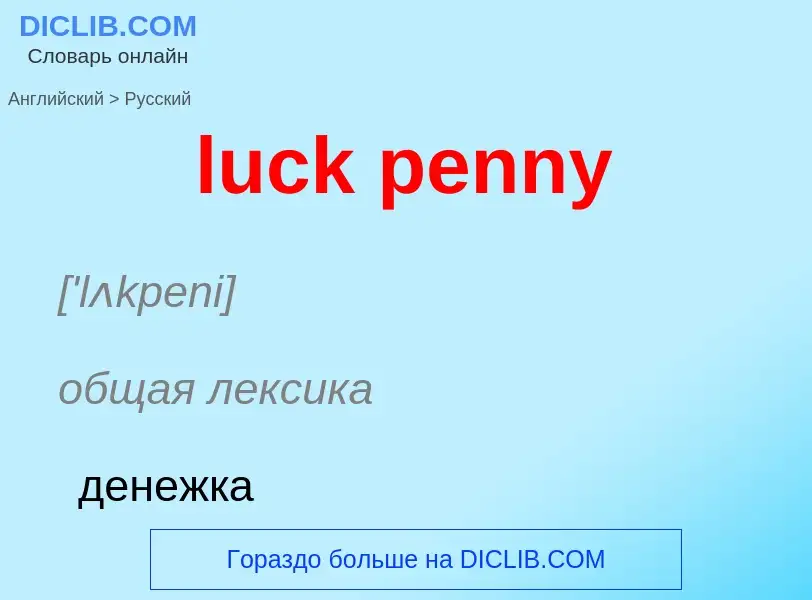Traducción y análisis de palabras por inteligencia artificial ChatGPT
En esta página puede obtener un análisis detallado de una palabra o frase, producido utilizando la mejor tecnología de inteligencia artificial hasta la fecha:
- cómo se usa la palabra
- frecuencia de uso
- se utiliza con más frecuencia en el habla oral o escrita
- opciones de traducción
- ejemplos de uso (varias frases con traducción)
- etimología
luck penny - traducción al ruso
['lʌkpeni]
общая лексика
денежка
монетка на счастье
[,penɪ'dredful]
общая лексика
"ужасы по дешёвке", низкопробный приключенческий роман в дешёвом издании
дешёвый журнал с рассказами о "потрясающих" приключениях (особ. для мальчиков)
разговорное выражение
низкопробный приключенческий роман в дешёвом издании
дешёвый приключенческий журнал
Definición
Wikipedia
An earnest payment or earnest money is a specific form of security deposit made in some major transactions such as real estate dealings or required by some official procurement processes to demonstrate that the applicant is serious and willing to demonstrate an earnest of good faith about wanting to complete the transaction.
In the Middle Ages, the earnest payment was called variously an earnest penny, Arles penny, or God's silver (in Latin Argentum Dei). It was either money or a valuable coin or token given to bind a bargain, notably for the purchase or hiring of a servant. According to Black's Law Dictionary (sixth ed.), Et cepit de praedicto Henrico tres denarios de Argento Dei prae manibus ("And he took it from the aforesaid Henry [sealed by a] silver three pence [piece] handed over [in the sight of] God").
A potential buyer of property of high value such as residential real estate generally signs a contract and pays a sum acceptable to the seller by way of earnest money. The amount varies enormously, depending upon local custom and the state of the local market at the time of contract negotiations.
If the seller accepts the offer, the earnest money is held in trust or escrow.
These funds may be held directly by the seller's attorney, the real estate broker (as in the State of New York) or by a settlement or title company (as in states like California, Florida, and Texas).
When the transaction is settled then the deposit is applied to the buyer's portion of the remaining costs. If the offer is rejected, the earnest money is usually returned, since no binding contract has been entered into.


![half-penny]]. half-penny]].](https://commons.wikimedia.org/wiki/Special:FilePath/Cover of Illustrated Chips 298 (1896).jpg?width=200)
![Advertisement for an 1886 penny dreadful of ''[[Spring-heeled Jack]]'', “the terror of London” Advertisement for an 1886 penny dreadful of ''[[Spring-heeled Jack]]'', “the terror of London”](https://commons.wikimedia.org/wiki/Special:FilePath/Jack4.jpg?width=200)
![Cover of a ''[[Varney the Vampire]]'' publication (1845) Cover of a ''[[Varney the Vampire]]'' publication (1845)](https://commons.wikimedia.org/wiki/Special:FilePath/Varney the Vampire or the Feast of Blood.jpg?width=200)
